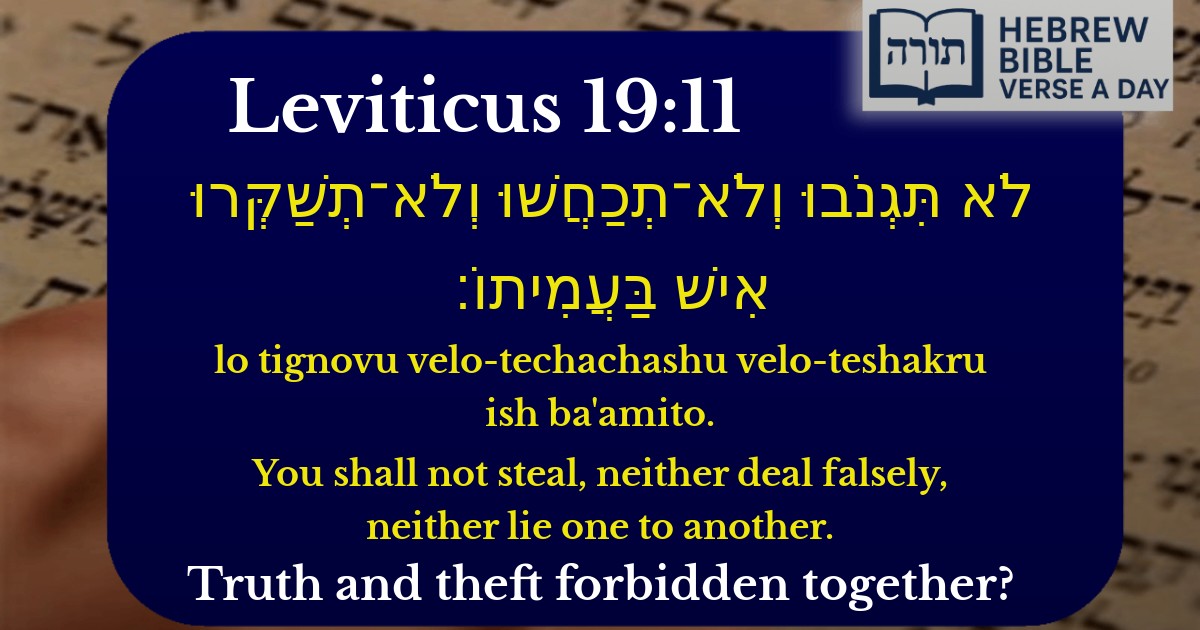Frequently Asked Questions
Q: What does Leviticus 19:11 mean?
A: Leviticus 19:11 contains three commandments: not to steal, not to deal falsely, and not to lie to one another. According to Rashi, 'not to steal' refers to outright theft, while 'not to deal falsely' includes dishonest business practices. 'Not to lie' prohibits deception in speech. Together, they emphasize honesty in all dealings with others.
Q: Why is Leviticus 19:11 important in Judaism?
A: This verse is important because it establishes foundational ethical principles in Jewish law (Halacha). The Rambam (Maimonides) explains that honesty and integrity in business and personal relationships are essential for a just society. The Talmud (Sanhedrin 86a) also links these commandments to maintaining trust and harmony among people.
Q: How does Leviticus 19:11 apply to everyday life?
A: This verse applies to daily life by teaching us to avoid theft, fraud, and deceit in all forms. For example, the Shulchan Aruch (Choshen Mishpat) details laws about fair business dealings, prohibiting lying about prices or quality of goods. Even 'white lies' are discouraged unless they serve a greater purpose, such as preserving peace (Yevamot 65b).
Q: What is the difference between 'not to steal' and 'not to deal falsely' in Leviticus 19:11?
A: Rashi explains that 'not to steal' (לֹא תִּגְנֹבוּ) refers to outright theft, such as taking someone's property without permission. 'Not to deal falsely' (וְלֹא־תְכַחֲשׁוּ) refers to deceptive practices, such as misleading someone in business or withholding payment. The Talmud (Bava Metzia 61b) gives examples like using false weights or measures.
Q: Can you ever lie according to Leviticus 19:11?
A: Generally, lying is prohibited, but there are rare exceptions in Jewish law. The Talmud (Ketubot 16b-17a) permits lying to preserve peace or avoid embarrassment, such as praising a bride even if she is not physically beautiful. However, the Midrash (Vayikra Rabbah 9:9) emphasizes that honesty should always be the default unless there is a compelling ethical reason to deviate.


Prohibition Against Theft and Deception
The verse "לֹא תִּגְנֹבוּ וְלֹא־תְכַחֲשׁוּ וְלֹא־תְשַׁקְּרוּ אִישׁ בַּעֲמִיתוֹ" (Vayikra 19:11) contains three prohibitions related to honesty and integrity in interpersonal dealings. These commandments are foundational to ethical behavior in Jewish law and society.
1. "לֹא תִּגְנֹבוּ" – "You shall not steal"
Rashi explains that this prohibition refers specifically to stealing money or property, as opposed to the earlier prohibition in the Ten Commandments (Exodus 20:13) which refers to kidnapping (גניבת נפשות). The Talmud (Sanhedrin 86a) derives this distinction from the context of the verse, which deals with monetary matters.
2. "וְלֹא־תְכַחֲשׁוּ" – "Neither deal falsely"
This prohibition refers to denying a debt or obligation. The Sifra (Kedoshim 3:4) explains it as falsely denying that one is holding another's property or money.
3. "וְלֹא־תְשַׁקְּרוּ אִישׁ בַּעֲמִיתוֹ" – "Neither lie one to another"
This broad prohibition against lying encompasses all forms of verbal deception. The Talmud (Pesachim 113b) teaches that even small "white lies" can lead to greater falsehoods.
Underlying Principles
These three prohibitions together establish a comprehensive framework for ethical business and personal conduct: